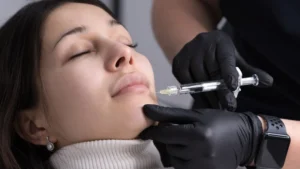As women go through menopause, a natural phase marking the end of their reproductive years, various changes unfold within their bodies. One intriguing aspect that arises during this transition is the occurrence of a burning sensation in the tongue, often referred to as “burning tongue.” Understanding the link between menopause and burning tongue is essential because it sheds light on the broader range of experiences women may undergo during this life stage.
This phenomenon captures attention due to its impact on daily life and well-being. The discomfort can range from a tingling sensation to an outright burning feeling in the mouth. Let’s explore this connection and uncover insights into managing this discomfort effectively.
Menopause: An Overview
Menopause is a significant milestone in a woman’s life, marking the end of her reproductive years.
It typically occurs between the ages of 45 and 55, although the exact timing varies for each individual.
During this phase, the ovaries gradually reduce the production of hormones, including estrogen and progesterone, which regulate the menstrual cycle.
Hormonal Changes
Hormonal fluctuations are at the heart of menopause. The ovaries’ decline in estrogen production triggers various physical and emotional changes.
As estrogen levels decrease, the menstrual cycles become irregular, eventually leading to their cessation.
Read Also: How Long Does Menopause Last After Total Hysterectomy?
This hormonal shift also contributes to a range of symptoms like hot flashes, night sweats, and mood swings.
Menopause and Burning Tongue
Menopause is a natural phase in a woman’s life that brings about various changes due to shifting hormone levels.
One intriguing phenomenon that some women experience during this time is the occurrence of a burning sensation in the tongue, a condition known as “burning tongue.”

Exploring the Connection
- Burning Tongue Defined: Burning tongue, also referred to as burning mouth syndrome, is characterized by a persistent burning or tingling sensation in the tongue, lips, gums, or other parts of the mouth. This discomfort can vary in intensity and may even extend to the throat.
- Prevalence During Menopause: Research indicates that burning tongue is more commonly reported by women in menopausal and postmenopausal stages. The hormonal changes that accompany menopause, including a decline in estrogen levels, are believed to contribute to the development of this sensation.
Hormonal Influence
- Estrogen’s Role: Estrogen plays a crucial role in maintaining the health of oral tissues and regulating the function of taste buds. As estrogen levels decrease during menopause, these changes can lead to alterations in the mouth’s sensory perceptions, potentially contributing to the burning sensation.
- Impact on Oral Health: The decrease in estrogen can also affect oral health, leading to issues such as dry mouth, altered taste perception, and an increased risk of oral infections. These factors collectively contribute to the discomfort experienced by women with burning tongues.
Other Contributing Factors
While hormonal changes are a primary factor, it’s important to note that a burning tongue can result from a combination of influences:
1. Nutritional Deficiencies: Inadequate intake of certain vitamins and minerals can affect oral health and contribute to the burning sensation.
2. Stress and Anxiety: Emotional factors like stress and anxiety can exacerbate the discomfort associated with burning tongue.
3. Oral Habits: Habits like teeth grinding or using abrasive toothpaste can irritate the oral tissues and worsen the sensation.
Read Also: How to Boost Immune System during Menopause?
Seeking Relief
If you’re experiencing burning tongue during menopause, there are steps you can take to find relief:
1. Hydration: Drinking sufficient water helps maintain oral moisture and may alleviate discomfort.
2. Balanced Diet: Consuming a diet rich in vitamins and minerals supports overall oral health.
3. Stress Management: Engaging in relaxation techniques can help reduce stress-related aggravation.
Managing Burning Tongue During Menopause
Dealing with a burning tongue during menopause can be distressing, but there are practical steps you can take to alleviate the discomfort and improve your oral well-being.
Self-Care Tips
1. Stay Hydrated: Drinking adequate water helps maintain the moisture levels in your mouth, reducing the sensation of burning.
2. Avoid Irritants: Steer clear of spicy, acidic, and overly hot foods, as these can further aggravate the burning sensation.
3. Oral Hygiene: Use a mild, alcohol-free mouthwash and a gentle toothbrush to maintain good oral hygiene without causing additional irritation.
Nutritional Choices
1. Balanced Diet: Consume a diet rich in fruits, vegetables, whole grains, and lean proteins. These foods provide essential nutrients that support overall oral health.
2. Vitamins and Minerals: Focus on foods containing vitamin B12, iron, zinc, and folate, as deficiencies in these nutrients can contribute to burning tongue.

Stress Reduction
1. Relaxation Techniques: Engage in relaxation exercises like deep breathing, meditation, and yoga to manage stress, which can exacerbate the discomfort.
2. Adequate Sleep: Prioritize getting enough restful sleep to support your body’s overall healing and coping mechanisms.
Read Also:Menopause and Anger Toward Husbands: All You Need to Know
Oral Comfort Measures
1. Cold Compress: Applying a cold, damp cloth to your tongue can provide temporary relief from the burning sensation.
2. Sugar-Free Gum or Lozenges: Chewing gum or using sugar-free lozenges can stimulate saliva production, helping to alleviate dryness in the mouth.
Professional Consultation
If self-care measures don’t bring relief or if the burning sensation persists, seeking professional guidance is essential.
1. Medical Evaluation: A healthcare provider or dentist can perform a thorough evaluation to identify any underlying causes contributing to the burning tongue.
2. Treatment Options: Depending on the evaluation’s findings, your healthcare provider may recommend treatments such as hormone therapy, pain medications, or oral rinses.
Lifestyle Adjustments
1. Manage Triggers: Identify and avoid any specific triggers that worsen the burning sensation in your mouth.
2. Patience: Recognize that managing burning tongue may require time and experimentation to find the most effective strategies for your unique situation.
Conclusion
In the realm of menopause, the phenomenon of burning tongue underscores the complex interplay of hormonal changes and oral health.
As estrogen levels decline during menopause, the sensory perceptions within the mouth may be altered, leading to the discomfort of a burning sensation.
By understanding this connection, individuals can approach the management of burning tongue with a tailored approach, incorporating self-care measures, nutritional choices, stress reduction techniques, and seeking professional consultation when needed.
While navigating this transitional phase, it’s essential to remain patient and committed to finding the strategies that work best for you.
Through a combination of informed choices and support, managing burning tongue during menopause is achievable, contributing to an improved sense of well-being.
FAQs (Frequently Asked Questions)
1. What is burning tongue syndrome?
Burning tongue syndrome, also known as burning mouth syndrome, is a condition characterized by a persistent burning or tingling sensation in the mouth, particularly the tongue, lips, and gums.
2. Why does burning tongue often occur during menopause?
Burning tongue is more commonly reported during menopause due to the hormonal changes that affect oral tissues and sensory perceptions. The decrease in estrogen levels plays a significant role in this phenomenon.
3. Can stress worsen the burning sensation?
Yes, stress and anxiety can exacerbate the discomfort of burning tongue. Engaging in stress reduction techniques such as meditation and deep breathing may help manage the symptoms.
4. How can I alleviate the discomfort of burning tongue?
Practical steps include staying hydrated, avoiding spicy and acidic foods, maintaining good oral hygiene, and incorporating stress reduction techniques into your routine.
5. Are there specific vitamins and minerals that can help?
Vitamins B12, iron, zinc, and folate are essential for oral health. A balanced diet rich in these nutrients may contribute to alleviating burning tongue.
6. When should I seek professional consultation for burning tongue?
If the burning sensation persists or becomes severe, seeking medical advice from a healthcare provider or dentist is recommended to identify any underlying causes.
7. What treatments are available for burning tongue during menopause?
Treatments may include hormone therapy, pain medications, oral rinses, and addressing nutritional deficiencies based on medical recommendations.



